|
|
|
Sort Order |
|
|
|
Items / Page
|
|
|
|
|
|
|
| Srl | Item |
| 1 |
ID:
175364
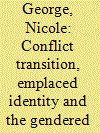

|
|
|
|
|
| Summary/Abstract |
Although there is growing recognition that women’s participation is critical for the durability of peaceful conflict transition, grounded research examining the political scale of women’s participation has not been common. Where feminist researchers have tackled this topic, they have generally reproduced binary representations of political space, sometimes strongly critical of local spaces as restrictive of women, sometimes strongly critical of a hegemonic liberal international. In this article, I address the issue of women’s participation in conflict transition governance from another more ethnographic angle, drawing from fieldwork conducted in the Solomon Islands, a Pacific Islands country destabilised by conflict in the late 1990s and early 2000s. I apply theories of political scale to consider where and how women are politically active in the conflict transition environment, how that political activity is constituted relative to other political scales and where and how women seek to make their political ambitions understood. The ‘emplacement’ lens I develop offers a critical vantage point for analysis of the ways women constitute political identities and the agendas they might meaningfully progress, at scales ranging from the small worlds of the household and the community to the broader scale of national politics.
|
|
|
|
|
|
|
|
|
|
|
|
|
|
|
|
| 2 |
ID:
175361
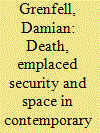

|
|
|
|
|
| Summary/Abstract |
By adopting a spatial approach to analysis, this article examines the significance of death in Timor-Leste and its relationship to security and peace. The main argument is that a person’s security in Timor-Leste is very often made possible via the sustaining of what is referred to here as ‘cognate communities’ which comprise both the living and the spirits of the ancestral dead. Grave-making as a form of ‘emplaced security’ – an expression of agency which results in the creation or transformation of a place in order to mitigate threat – enables a particular kind of space whereby the living as part of cognate communities are able to venerate their dead. In turn, engagement with the ‘spatial turn’ demonstrates how this form of emplaced security is not static, but rather is dynamic and adaptive as communities formed through custom constantly interact with broader social changes and spatial transformations. Even as grave-making represents a micro-form of emplacement, such acts both produce and respond to different spatial orders, including more abstract forms bound up with nation formation. As such, the ‘spatial turn’ shows how burial represents both an intimate and petite act of place-making while also intersecting with different spatial orders and scales that interact with meta-narratives including religion, modernisation and nationalism.
|
|
|
|
|
|
|
|
|
|
|
|
|
|
|
|
| 3 |
ID:
175362
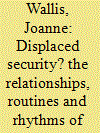

|
|
|
|
|
| Summary/Abstract |
This article considers what treating individual international interveners engaged in peacebuilding work as referent objects can tell us about emplaced security. This is important because individual interveners are diverse, embodied agents who can impact the agency, peace and security of conflict-affected populations. It argues that applying an ontological security lens can provide a partial explanation for why interveners develop narratives and perform practices, including why they sometimes identify and behave in counterproductive, and even damaging, ways. The final section considers why an analytical focus on place is valuable, noting that place-based experiences and place-identities are formative of ontological security. It argues that treating interveners as a referent object provides opportunities to rethink the tendency to focus on home as the key site of emplacement in the ontological security literature. Building on this, it argues that examining the emplaced security of interveners invites us to examine the political nature and consequences of interveners’ physical and ontological security-seeking narratives and practices, including their creation of the material and ideational structures of intervention spaces and places.
|
|
|
|
|
|
|
|
|
|
|
|
|
|
|
|
| 4 |
ID:
175358


|
|
|
|
|
| Summary/Abstract |
This introduction provides an overview for the following collection of articles that engage with, and aim to extend, recent scholarship emphasising space as a category of analysis in peace and conflict studies. Attempts to ‘spatialise’ this field of enquiry have emphasised the ways actors and ideas travel and transform across scale (from the personal to the local, regional and global) and how agents, actors and identities constitute, and are constituted by, space and place in dynamics of conflict and peace. Attention to space has increased appreciation of the complex nature of nature of war- and peace-‘scapes’, and reflects upon space as material and symbolic, given meaning through peoples’ embodied activity and interactions. The articles in this issue engage with the foundations of the spatial turn and build upon innovations in spatial analysis of peace and conflict by focussing on the idea of ‘emplacement’ and emplaced security as critical to peacebuilding efforts and processes of conflict transition. To do so, we consider place in a relational sense, focussing on attachment, affective connection and narratives of place-identity as these are connected with conflict management, security, governance and political ordering.
|
|
|
|
|
|
|
|
|
|
|
|
|
|
|
|
| 5 |
ID:
175363
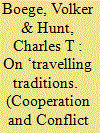

|
|
|
|
|
| Summary/Abstract |
Important sources of everyday security – variously labelled as customary, informal, traditional or autochthonous – are commonly associated with rural spaces and attributed to the lack of presence or traction of state institutions. However, these practices are not limited to peripheries; they can travel. Their structures, authority and legitimacy can be re-produced in new settings, often in response to the perturbations caused by conflict, while also changing in the course of travel. Consequently, in urban spaces – the supposed ‘centre’ of the modern state – people’s sense of security can be profoundly influenced and shaped by the ordering logics of such ‘travelling traditions’. This has ramifications for ‘emplaced security’ – both short-term responses to acute vulnerability of displaced communities and emergent longer-term forms of order. This article explores the utility of the ‘spatial turn’ in peacebuilding theory for better understanding this phenomenon. It uses the cases of Vanuatu and Liberia to demonstrate how more nuanced understandings of the (re)construction of authority between and across places and scales may help comprehend how people generate everyday emplaced security. A spatial approach provides analytical leverage that can help to highlight how a phenomenon such as travelling traditions contributes to the formation and substance of emplaced security.
|
|
|
|
|
|
|
|
|
|
|
|
|
|
|
|
| 6 |
ID:
175360


|
|
|
|
|
| Summary/Abstract |
This article examines the relationship between place and peace and security in Solomon Islands. Place is understood not only as a geographical location, but as a social, material and symbolic arena where constructions of what constitutes peace and security are continually remade. Place-based constructions of peace and security challenge pervasive spatial assumptions which underpin dominate security discourses about post-conflict Solomon Islands, assumptions which view security as a public good delivered by centralised state institutions to the peripheries. Employing a case study of one particular place, the Gela Group of Islands, this article describes place-based practices, processes, institutions and ideals of peace in contrast to a state ideal of security and argues that far from existing in separate spaces, both place-based and state-based forms of security are in constant interaction and shape each other over time. This article suggests that a way forward in increasing peace and security outcomes in Solomon Islands is to focus on the relationship between place-based forms of security and the state. Doing so acknowledges the political, relational and spiritual worlds of people of place, worlds which fundamentally shape peace and livelihood outcomes, and which require a different understanding of the spatial make-up of the state.
|
|
|
|
|
|
|
|
|
|
|
|
|
|
|
|
| 7 |
ID:
175359
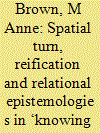

|
|
|
|
|
| Summary/Abstract |
How we approach knowing conflict and security makes a difference. This article first considers how reification, instrumental subject/object relations and the drive for certainty and control undermine effective knowledge and practice in questions of conflict and peace. It then turns to what the spatial turn and notions of emplaced security might offer to working against violence. As with any theoretical perspective, the spatial turn can itself be reified, repeating epistemological relations entrenched in much security analysis. The spatial turn and emplaced security explicitly highlight alternative, more relational knowledge practices, however. A relational epistemology approaches knowledge not only as information about a subject out there, but also as a form of practice with others which changes conditions of possibility for co-existence. If pursued, such approaches could help loosen the grip of narrow constructions of security, insecurity, the person, power and agency which dominate security analysis and obstruct understanding and the generation of alternatives in situations of entrenched conflict. An orientation to place could not only enable more nuanced accounts of peace and conflict, but support mutual recognition and exchange across division, assisting an ethic of attention and concrete peace and conflict resolution efforts.
|
|
|
|
|
|
|
|
|
|
|
|
|
|
|
|
| 8 |
ID:
175365
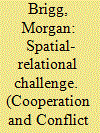

|
|
|
|
|
| Summary/Abstract |
The nascent spatial turn in peace and conflict studies is a promising development that expands conceptual resources and offers useful correctives to existing scholarship. However, the turn to space and place tends not to adequately emplace itself (including on its own European-derived terms) or sufficiently engage the socio-spatial difference of diverse peoples. Instead, a de-contextualised knower is invited to apply a new set of mobile scholarly tools in various settings without seriously considering diverse peoples’ conceptualisation and operationalisation of place in socio-political ordering. Long-standing Aboriginal Australian approaches to place, meanwhile, indicate the diversity and sophistication of approaches to space and place. They furthermore show that western political ontology – including the figures of the individual and the state embedded in much dominant scholarship – may not be relevant in many settings in which peace and conflict scholarship is undertaken. Realising the full potential of the spatial turn requires grappling with the relational emplacement of the knowing subject and the varied ways in which place configures socio-political order both for diverse peoples ‘in the field’ and in the centres of dominant forms of knowing in the Global North.
|
|
|
|
|
|
|
|
|
|
|
|
|
|
|
|
|
|
|
|
|